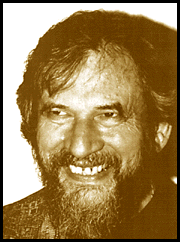Claudio Naranjo
photo of Claudio Naranjo
ClaudioNaranjo.net
Visionary anthropologist and psychiatrist Claudio Naranjo pioneered the clinical use of "feeling enhancers". Dr Naranjo has conducted MDA- and MDMA-assisted therapy both on a one-to-one basis and in group therapy sessions."The MDMA experience is something like artificial sanity, a temporary anesthesia of the neurotic self. I mostly use MDMA as an "opener" at some point in psychotherapy, not only for the wealth of the material gained during the session but for how it facilitates therapeutic work in the aftermath."Dr Naranjo suggests that the ideal feeling-enhancer will "elicit an expansion of emotional awareness without interfering with thinking". Given the mood-congruence of thought, this aspiration may in the end prove unattainable. But the development of safer "soul medicines" to deepen and optimise our emotional repertoire promises to enrich human life in decades to come.
Chilean-born Dr Naranjo first met psychedelic chemist Sasha Shulgin in 1962. It was Dr Shulgin who introduced Dr Naranjo to the substituted phenylisopropylamines - just before the young researcher set off to the Amazon to study his first soul-medicine ayahuasca.
Dr Naranjo went on to use MDA-assisted therapy in his private clinical practice in the 1960s. [See also Naranjo, C., A. T. Shulgin, and T. Sargent. 1967. Evaluation of 3,4-methylenedioxyamphetamine (MDA) as an adjunct to psychotherapy. Med. Pharmacol. Exp. 17: 359-364. 53] Dr Naranjo found that MDA was especially valuable as a "drug of analysis". MDA tends to promote the extraordinarily vivid recall of formative emotional experiences. In common with MDMA, MDA unlocks long-repressed childhood memories; its sensitive use can induce spontaneous age regression. Whereas on LSD, the recollection of negative experiences may precipitate a "bad trip", on MDA [and especially on its N-methyl analogue MDMA] even the most traumatic of childhood experiences can be calmly recalled. Normally painful memories can be accepted and "reformulated" without fear. At its best, MDA promotes exceptional self-honesty, openness and a sense of heightened authenticity. MDA also promotes a deep, non-possessive kind of love. "Unfinished business" in relationships can be resolved. In the right setting and with an experienced professional guide, a MDA-assisted session can have a hugely positive outcome of in the estimate of client and therapist alike.
But here we enter a methodological minefield. Critics of drug-assisted psychotherapy point to the absence of controlled clinical trials to validate claims of therapeutic success. Such critics also oppose steps to set up such trials on the grounds that there isn't enough scientific evidence to warrant conducting them.
Unlike the outlandish effects of major tryptamine psychedelics such as LSD or DMT, MDA-catalysed insights can potentially be integrated into the rest of one's life. Ideally, the therapeutic gain will be sustainable, whether wholly or in part. The neurological basis of any such healing process is currently unknown. Dr Naranjo discusses the use of MDA-like "feeling enhancers" and LSD-like "fantasy enhancers" as therapeutic catalysts in The Healing Journey (Pantheon Books, 1973).
Dr Naranjo's therapeutic use of MDA prefigured the development of MDMA-assisted therapy in the late 1970s and early 1980s. Dr Naranjo describes MDMA [Ecstasy] as the "champagne of feeling enhancers". Certainly the quality of thought and feeling characteristic of MDMA-induced states has a "cleaner", more lucid texture than its MDA-induced counterpart. MDA-induced states tend to have stronger psychedelic or mystical overtones. They may also carry a heavier hint of amphetamine-like stimulation. Media hype aside, MDMA has a better safety profile than MDA. Even so, over-indulgence in MDMA or MDA - or excess consumption of both by users of street pharmaceuticals - can exacerbate the common mental health problems that prompted their reckless overuse in the first instance. On the other hand, perhaps it will one day be accounted reckless, irresponsible or antisocial not to take a regimen of their better-designed successors. At present this prospect seems implausible; the Ritalin Kid might beg to differ.
Dr Naranjo argues that the acute risks of professionally conducted MDMA-assisted therapy are small; and the therapeutic breakthroughs sometimes profound...
"Since the effect of MDMA can be a peak experience or a delving into pain (or both), it is easy to see how it is possible that some persons find themselves in the garden of earthly paradise while others undergo the fires of purification - and the experience of the former is a gift to the latter."[quoted from Experience with the Interpersonal Psychedelics, the edited text of a talk Dr Naranjo gave as opening speaker at a 1993 Psychedelic Summit in San Francisco; and appearing in Ecstasy: The Complete Guide (2001) ed. Julie Holland, M.D.]
Dr Naranjo contends...
"What is needed now is not training but true expertise; the training of specialists who can use such psychotropic substances wisely and skillfully".In his text for Dr Holland's illuminating Ecstasy manual, Dr Naranjo observes that the feeling-enhancers open up "...a spontaneous willingness to keep the flame of love alive in the face of pain". Dr Naranjo argues that "the gate to happiness... lies in finding another attitude toward pain". On pain itself, Dr Naranjo states: "Suffering is inextricably bound to earthly existence".
This may still be so; but the unfolding biotechnology revolution will shortly make suffering optional - and just conceivably obsolete. In the still-speculative post-Darwinian era of paradise engineering, an entire lifetime of E-like states is technically feasible. A minority of contemporary ethicists would further argue that such E-like states are ideologically desirable too. Whether drug-driven or genetically preordained, mental superhealth can take many guises, ecstatic or otherwise. Utopian Pharmacology explores just one of them. On this scenario, lifelong states of empathetic bliss can become the default-setting of everyday waking consciousness.
dave@bltc.com
Refs
HOME
Leo Zeff
E. Merck
Charles Grob
MDMA: hotlinks
MDMA: synthesis
The Good Drug Guide
Ecstasy and Honesty
Paradise-Engineering
The Language of Ecstasy
Ann and Alexander Shulgin
Ecstasy: The Complete Guide
Dr Michael Mithoefer's PTSD trial
Critique of Huxley's Brave New World
Claudio Naranjo video on psychedelics
Albert Hofmann's LSD - My Problem Child
The serotonin system and spiritual experiences

